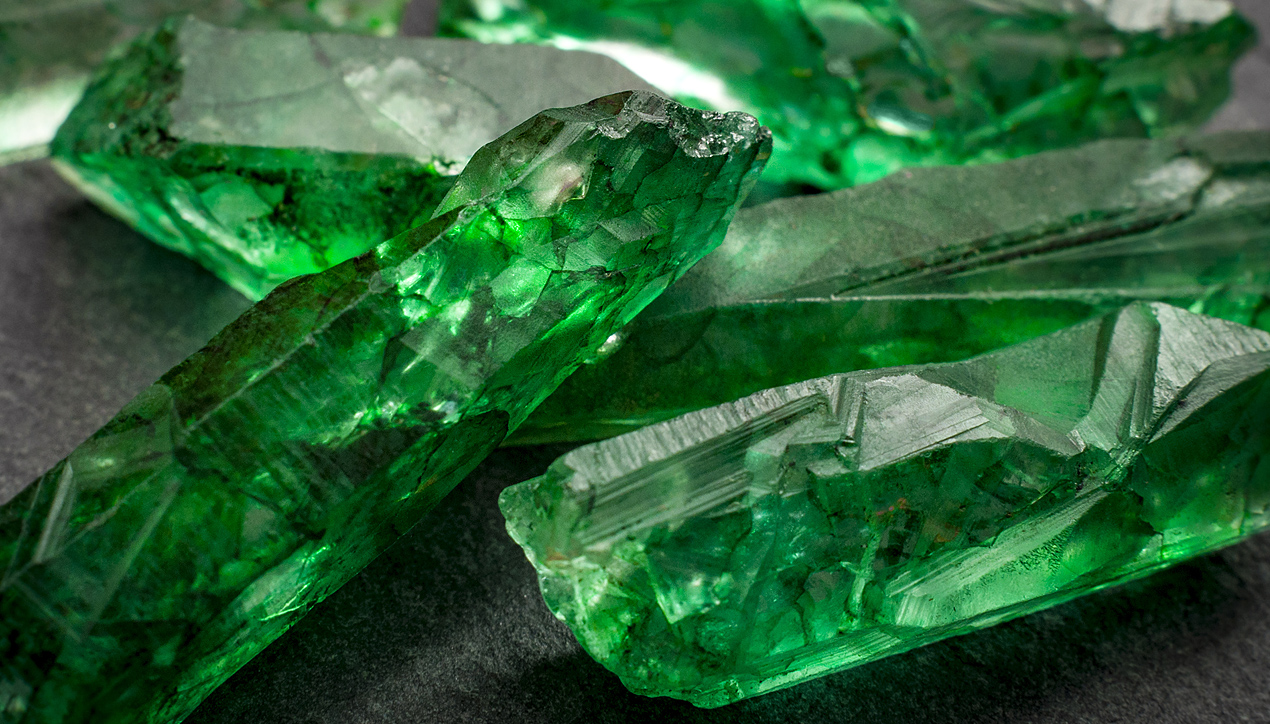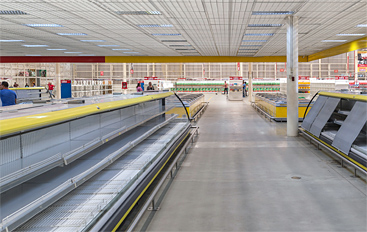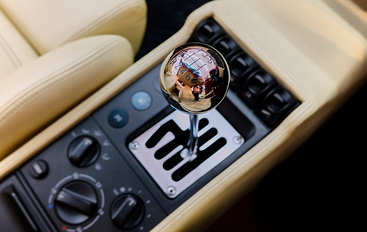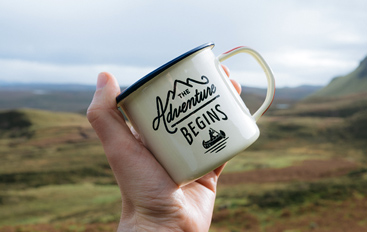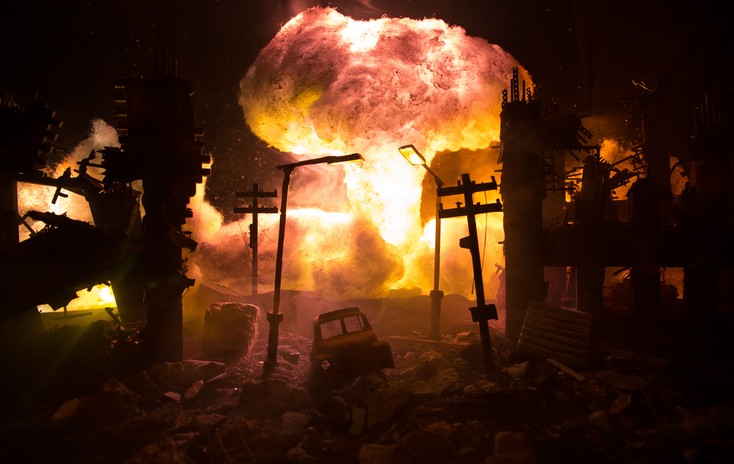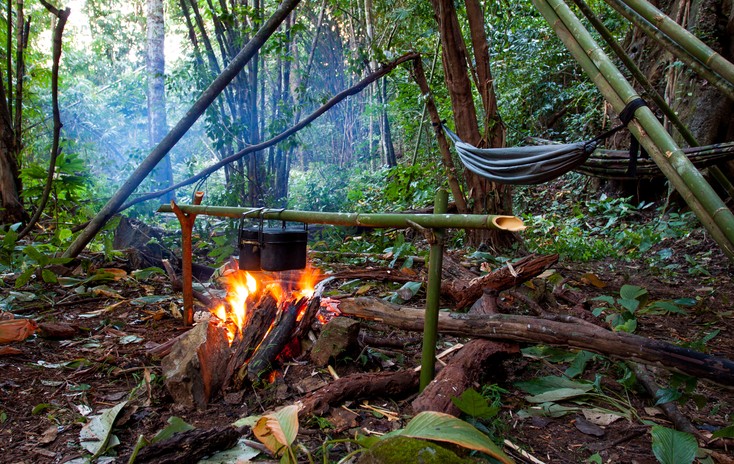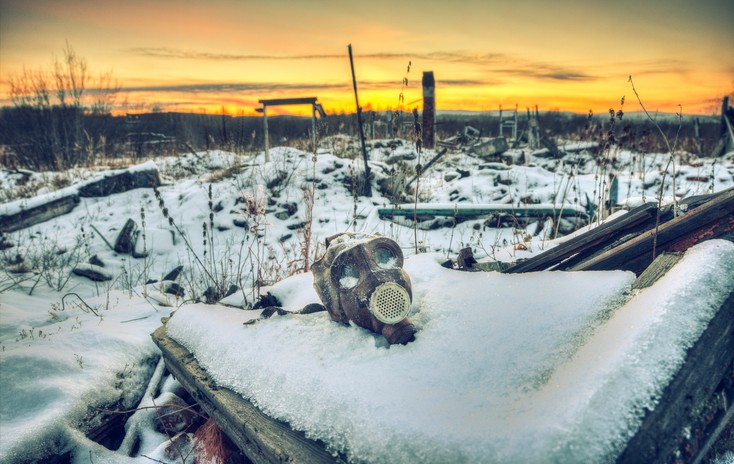What's Your Greatest Weakness?
A chain is only as strong as its weakest link. Let's get serious for a few minutes, and think about some of the real problems to be faced in prepping. Specifically, this page will address what your greatest weakness(es) might be.
What thing, things, or lack of things, will be the link that breaks the chain — and most prevents you being able to live through a prolonged or permanent breakdown of modern society? Without the system we usually depend on for things like food in the shops, mains water, electricity, internet, law enforcement, etc.
The idea here is that after you identify your greatest weakness(es), then you start to draw up plans for how you might eventually overcome them. It's good to think about this — because I think very often (and I am guilty of doing this myself), other things distract us from these very high priority needs. And they get neglected.
Meaning that for many preppers (and absolutely definitely for most people in general society), more time and effort needs to be put into overcoming their most important weaknesses. Which means correspondingly less time and personal resources are available for doing other less important tasks, and achieving less important goals — which may seem more appealing because they're more interesting and feel more "cool". Or because you can make more progress with them, and feel like you're getting somewhere. Or because other people appreciate them (and perhaps the other people you know don't appreciate the value of prepping).
Common Areas of Weakness
Depending on the speed of the collapse, and the particular details of how it happens, the greatest area of weakness for most people overall will vary. But it's likely to be one of the basic main essential areas of life — water, food, money, defence, medical requirements, and psychological/spiritual health and motivation. Have a think about how this applies to your own situation.
People no longer know information that's vital to sustain life—how to grow their own food, how to find drinkable water, what's in their food, how to build a fire and keep warm, how to survive in the natural environment, what the sky means and how to read it, when the growing seasons begin and end, what plants in the forest and fields are edible, how to track and kill and dress and eat and store game, how to farm without (or even with) chemicals and tractors, how to treat broken bones and other common medical emergencies, or how to deliver a baby, among other things.
Because of this "information deficit", we are out of touch with reality and are also standing on a dangerous shelf of oil-dependent, corporate-induced information starvation. In the 1930s during the Great Depression, far more people lived in rural areas than in the cities. The information about how to grow and preserve food, how to survive during difficult times, and how to make do with less was general knowledge. Today we know the names of the latest movie stars and how much their movies grossed, or what level the Dow Jones Industrial Average is at, but few of us could survive two months if suddenly the supermarkets closed.
Thom Hartmann, The Last Hours of Ancient Sunlight, p105 (original edition).
Water
For most people in good health and living in urban or suburban environments, I suspect the greatest need will be water. You can only live 2-3 days without water/fluids/hydration — and much less than that in very hot weather and/or if you're performing physically demanding tasks. Perhaps longer than that if you're lucky, and it's not hot, and you don't exert yourself physically.
Whether or not this does end up being the greatest need/weakness will depend on the exact nature of the emergency/collapse. In less-extreme emergency scenarios, the relevant authorities will put every possible effort into maintaining the mains water supply. In which case the most "popular" greatest weakness would be something else. But the electricity grid can't last forever, which means the mains water supply can't last forever. So at some point people en-masse are going to have to find an alternative water supply. See here for more about water.
Money
Especially if the collapse is quite slow and gradual, one very major area of weakness for many people will be money. How long could you live on your savings and investments if you had to? What if you lost your job, and couldn't get another job? Such as in a deep, long-term market crash, perhaps similar to the depression of the 1930s or worse. Note that in the 1930s far more people lived in rural areas, close to food production, than now when most people live in cities and suburbs.

A big part of prepping is learning to resist the urge to use your money for things from modern society that you don't really need. Photo by Pixabay/stevepb.
The money issue will be especially a problem for people who are renting, or still paying off their home — and if the crash, when it happens, is slow enough that banks (and the rest of the legal system) are still intact enough to be able to force evictions. This is of course already happening to some people. This present time could be thought of as being the early, slow, stages of the final collapse.
The other thing to think about money is how much of it in modern life gets wasted on things that we don't really need. Most people wouldn't think twice about spending $21,000 on a car, but would think it ridiculous to spend the same amount of money on 30,000 cans of assorted on-special $0.70 cent tinned food. With a shelf life of over 100 years (apart from a few exceptions like tomatoes). That would keep you in food for a long time in a crisis.
Food
In very many medium-term, long-term, and permanent collapse scenarios, another one very high on the list of priorities is going to be food. This one is fairly obvious to most people and it's possibly the first thing that average people think of when they think of what prepping is about.
Most people can live 2-3 weeks without food (and less than that in non-optimal conditions as there are likely to be in a collapse) before starting to have real problems.

Poultry can be kept in many suburban gardens, and have great benefits in an economic crisis. Photo by Pixabay/klimkin.
Temperature
For some people temperature (either too hot or too cold) will be their greatest need. Generally this will apply to people who live in extremely hot or cold environments. If the temperature is extreme enough in either direction, it's possible to die of heat or cold in less time than you'd die from having no water supply.
So this may be the greatest weakness for some people e.g. who live in very cold areas and currently depend on the grid for their heating, etc. Having a large collection of warm clothing and blankets (and even face and hand protection) does not cost a lot of money.
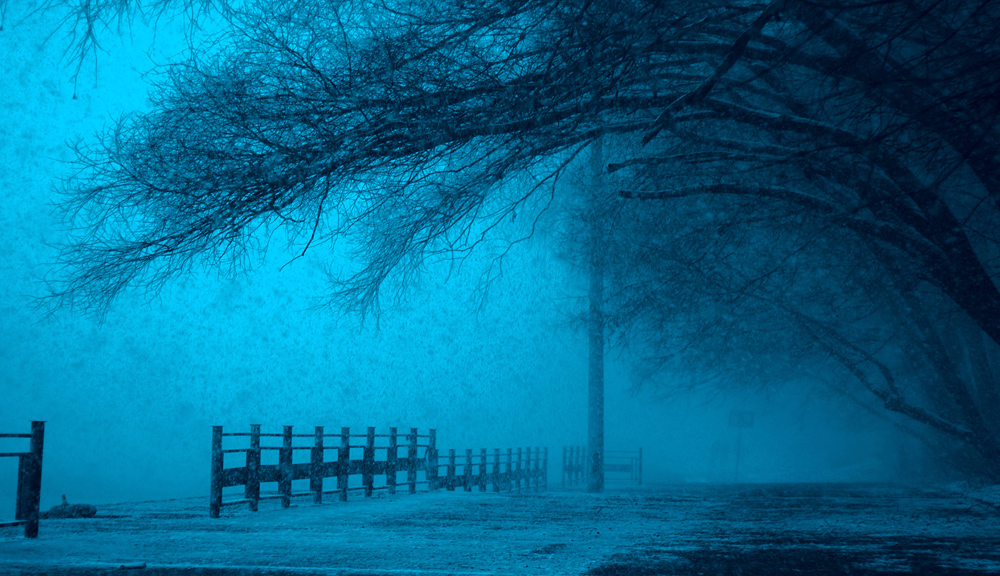
In very cold areas your priorities will be different. Jackets and blankets are cheap, and can be used very many times over (unlike food and water). Photo by Pixabay/xusenru.
In Australia there are not many places that get really cold, on a world scale of coldness. In some countries other than Australia, and perhaps in a few places in Australia, cold would be much more of a problem. And would require more attention than stocking up on warm clothes and blankets, and perhaps having a supply of firewood available.
The other situation where cold can be a real problem is if you're both wet and cold. For example if you're outdoors and it's raining and it's cold. This can certainly be a real problem (as in it could kill you). I still well remember a line from a childrens outdoor book I had when I was eight years old. The book said, "Wet skin loses heat 20 times faster than dry skin". I just did a quick Google search on this statistic — most pages say it's 25 times faster, and a page near the top of the search results said 25-30 times faster.
Some materials are worse than others for this, as the rate at which they hold the water close to your skin (and carry away your body heat) varies a lot. Some materials can still insulate you somewhat (and keep your body heat from being lost so fast) even when wet. Cotton is especially bad — so bad that some people call it "death cloth" under these conditions. Wool is much better, and most synthetics are much better — especially ones that are specifically made for outdoor use, like those sold in outdoor adventure shops.
On the Titanic, my understanding is that far more people died from the low temperature of the ocean water than from the water itself. There are some debates as to technically whether more people died from drowning or hypothermia on the Titanic — but here they are saying that many (and perhaps most) of the people who died in the water were rendered by the cold either unconscious, or too out of it to hold their faces out of the water, and then they technically drowned before they technically froze to death. But even in these cases it was the cold which caused most of them to drown, and they would not have drowned except for the cold (since most of them had life vests on).
Location and Population
For most people in Australia, and many modern countries, very high on the list of greatest weaknesses is living in an overpopulated area. Basically this means living in any city, and almost any suburb. For long-term post-permanent-collapse survival there will need to be enough available food in your local area to feed the human population in your local area. This essentially means moving to a rural area as a long-term goal.
This is such a vital point that I've even heard people say the term "urban prepper" is an oxymoron. Meaning a phrase that's logically inconsistent within itself, and therefore impossible. Along the lines of "ethical banking", "Microsoft security", "Facebook privacy", "dry water", and "world's most famous spy".
I suspect that for a lot of people, this issue may feel like it's a deal-breaker for wanting to be a prepper. Especially at first, when not used to the idea, and especially if you've spent your whole life thinking of the city as the place to be. If moving away from the city seems very daunting to you, try as hard as you can to think of any ideas that make it feel more friendly and appealing. Anything at all. Even a little tiny bit, at first, is better than nothing. And then you can keep trying to build on that. Perhaps there are things you liked from movies, books, or TV shows about rural life (or life in the old days before modern technology). Perhaps games you played as a child.
Perhaps you could begin just by starting a collection of images of low-tech rural life that you find attractive, and look at them regularly. You could even print them, and stick them up on walls, or somewhere you look at regularly like your fridge or office partitions. Or just keep them in electronic form on your phone or computer and look at them regularly. Perhaps use them as desktop backgrounds, or as a slideshow screensaver.
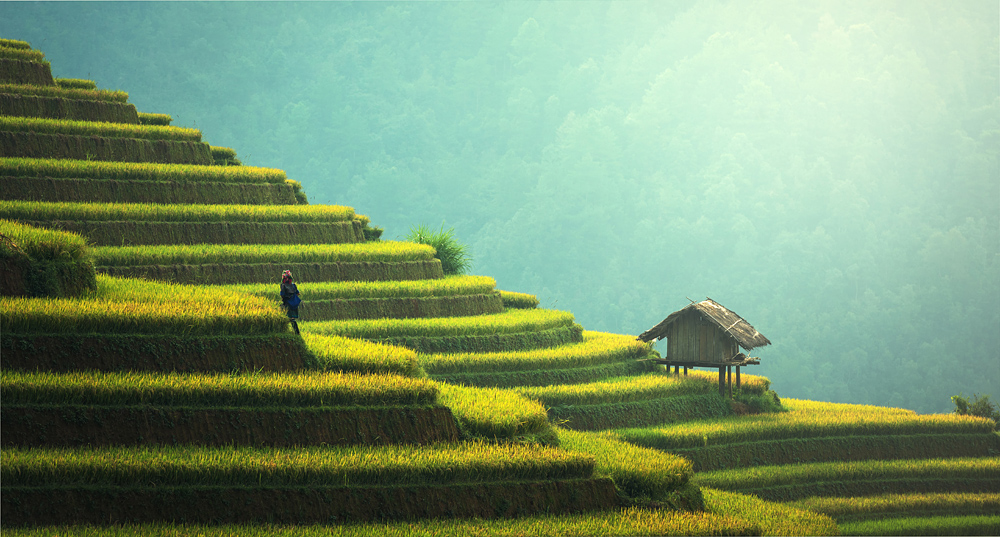
Looking at beautiful images of low-tech food production can help to offset the effects of our constant bombardment with beautiful images of modern high-tech life. Photo by Pixabay/sasint.
The alternative that many people choose instead is to stay in an urban area, while planning to "bug out" to a rural area when the need to arises. This is much, much better than doing nothing and having no plans — but nowhere near as good as already having an established life in a rural area by the time a permanent crisis unfolds.
As a "homework" exercise you can try searching rural properties for sale on online real estate websites. Also looking at online maps (e.g. Google Maps, both the standard and the satellite view) for green areas which look like high rainfall areas. And other features like nearby bushland (for bugging out if required).
Click on this link to view acreage properties for sale across Australia. You can change the settings to include a particular town, a maximum price, a minimum number of square metres, etc.
Australia has one of the lowest population densities overall of any country. And also one of the highest rates of urbanisation. These two facts, when combined, mean that Australians as a whole have more to gain than perhaps any country in the world (and definitely we'd be in the top very few countries in this sense) from large numbers of people moving to rural areas.

Living rurally allows a great many more options for survival without the commercial food industry, including keeping larger animals than you can in a suburban home. Photo by Pixabay/TheDigitalArtist.
People who currently live in rural areas may not be so keen on the idea of large numbers of ex-urban people moving to rural areas. But now add into the equation the fact that the collapse of western civilisation will undoubtedly mean wars will start, as the balance of world power changes, and is fought over. It's highly likely that at some point after the collapse — sooner or later — Australia will be invaded by a hostile nation.
If almost everyone in Australia living in cities is by that time dead — and there's only a very sparse population of survivors living in rural parts of the country — it's going to be much easier for our country to be taken over. If there's a high enough population living in rural areas, who are well prepared to not only live off the land but also to defend against armed attack — that can only be a very good thing in terms of national security. So in this (eventually critically important) sense, having more people living in rural areas is actually an asset to those who already live in rural areas.
Defence
Which brings us to another major area of weakness for many average people — defence. This is one of the difficult ones to get on top of, and for many reasons. If you've never lived through a war or done active military service (or perhaps worked in law enforcement, or as a security guard in South Africa or Columbia, etc.), it's hard to realistically imagine (let alone have practical experience of) what this kind of situation would be like.
Another reason is that in ordinary peacetime suburban life, it's difficult to train for these types of events in a a realistic setting. It's not impossible though. When I read the book "Contact" by Max Velocity, it was the first time I can remember feeling somewhat reassured that it was actually possible to realistically solve this problem, for average people, in a total and permanent collapse situation.
This famous movie scene illustrates more than the specific relevance of "Don't bring a knife to a gun fight", but also a general principle. You could spend hours each day for years training for something (like the swordsman may have) but fail because of lack of an overall broader perspective.
Air
Air is even more of an immediate need than water, or almost anything else. You can't live for long at all without a breathable air supply. While the scenarios that would result in not having breathable air are more specific and less likely to happen than some of the others, it is a vital need of life. Have a think about some of the ways you can prepare to ensure a supply of breathable air.
Some things to consider would be "gas" masks (either full head cover ones like on all those prepping photos you see in the media) or, less effective but still very useful, the ones that cover just your nose and mouth and can be easily found in hardware stores. Also you would want a good supply of filters for whatever type(s) you have.
Another aspect of air to consider would be if you're constructing, or even thinking about constructing any kind of shelter that's not well ventilated. Such as a nuclear fallout shelter. There's a very good video by Cresson Kearny (author of "Nuclear War Survival Skills") about shelter ventilation, which is part of the DVD box set, I'll have a look and see if it's available anywhere else like on YouTube... I haven't found it yet but I did find one by him about shelters where he very briefly demonstrates the fanning action that he uses to pump air in and out of shelters. Chapter six of Nuclear War Survival skills also covers this.
Attitude and Inner Resilience
Nearly everyone in modern life is used to having things a certain way (e.g. buying food from supermarkets, and perhaps spending many hours a week on electronic entertainment, etc.). And also used to goals and ambitions which are based on modern culture values (like having a more expensive car or house). If that's all you have to motivate you and to find meaning in your life — when these things are taken away, there will be a very, very big void.
This will be true of anyone in modern society, even most of those who have prepared for its demise. But it will be far more true of people who haven't got anything else to fall back on, in terms of what motivates them and what gives them meaning in life.
The solution to this is to develop interests in things that will still exist without the modern economy and modern civilisation. Find anything you can that you actually like, and are interested in, and can draw both meaning in life and goals for the future from. Religion and history (that's older than about 100-200 years) are good examples, since much of this is based on the lives of people before modern high-tech society. Especially history as it relates to common, average people (rather than the ruling classes like kings and queens and emperors and the upper class). Every Bible story was written by, and is about the lives of, people who lived a long time before modern high-tech society. Also low-tech hobbies like organic gardening/agriculture, making things using hand tools, etc. And also prepping itself.
Fitness
Many people in modern society are well below their peak physical fitness — or even an adequate level of fitness to engage full-time in physical work. Which would be most of the work that people do after a collapse of modern society. Think about what extent this applies to you, and what you can do about it. Click here to read more on how to get fit.
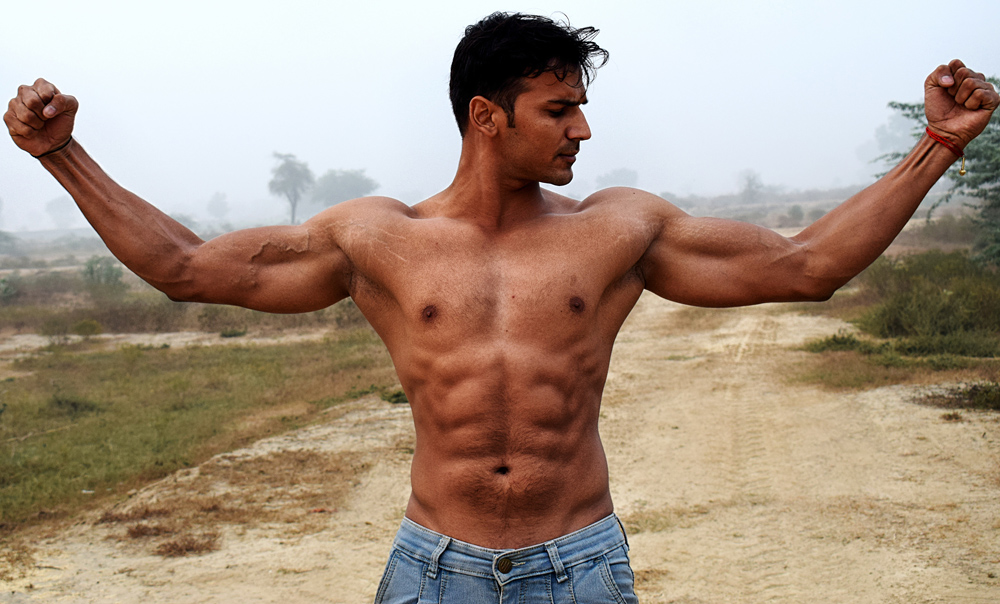
Being fit and strong will be extremely valuable in a post-collapse situation. Though you don't need ultra-low body fat like a competition athlete. Photo by Pixabay/deepkhicher.
Health
For other people — and I am in this category — their greatest weakness will be their health. (Or lack of health). If you're dependent on medications, is there no chance at all of you improving your health condition enough to ever come off them? How much of them can you store?
I'll add a link to the general disclaimer here that nothing on this site is official advice, and least of all official medical advice. But I've heard that some preppers stock up on some types of pet antibiotics. Which are, in some cases, supposedly essentially identical to the human versions — but can be purchased without a prescription. If you're interested in this, it's also very important to know that there are some types of antibiotics that can go off after a long period of storage and make you very sick. This is relatively rare among pharmaceuticals/medications/drugs — most of which just lose their potency (meaning that they work less than they would have originally, or don't work at all) after being stored a very long time (like years), but aren't actually dangerous to take. But a few drugs, including some antibiotics, become dangerous to take after being stored a long time.
Impossible Problems
If you have a weakness that's completely impossible to overcome (e.g. being an incurable paraplegic), that doesn't mean that prepping isn't for you. What can you do in terms of prepping? Despite all the complaints you may read online about "armchair experts" being losers, doing nothing else apart from accumulating a lot of practical, useful knowledge is still a very very useful thing.
Even if "all" you can do in a collapse is remain totally calm and unfazed, while everyone around you is freaking out over the crisis at hand, as you explain clearly, convincingly, and correctly exactly what they need to do in order to survive — and you have years worth of knowledge which has by then become unavailable to the people around you by any other means (e.g. there's no more electricity or internet) — then the people around you will have a very strong motivation to do everything they can to keep you as alive and healthy as possible.
Even if you're 100% totally dependent on modern civilisation and technology, with zero chance of ever not being so — there's still many good reasons to be a prepper. The most popular one being to help your loved ones with prepping. I've heard of preppers that are diabetics, and preppers who are dependent on having kidney dialysis multiple times a week. And who realise they have no chance of surviving a permanent and total collapse of society, but have become preppers for the sake of their loved ones.
This can still be done even if no-one that you care about is remotely interested in prepping (or are against it even). If no-one you care about is interested in prepping you may still be able store up a lot of items that will eventually become essential items needed for survival. Perhaps you can convince your family to move to a better location (like a less urbanised one) for some other non-prepping-related reason (e.g. you can get a job there perhaps, or for a career change). Perhaps you can have a productive garden or animals "just as a hobby", or to teach the kids about them, or for any reason.
Perhaps all you can do is learn a lot of information — which everyone around you may suddenly become very, very keen to learn, once it becomes apparent that they really do need to learn this stuff. If civilisation has collapsed enough that you won't be able to survive long, then its probably collapsed enough that a lot of your loved ones are going to become extremely keen to know what you know. And you can impart a lot of information in a short space of time when people are sufficiently motivated. Plus you can keep a collection of books and other information which will eventually become essential for people to know. Much of it being the kinds of things that everyone (except the very rich) would have known 200+ years ago.
My Greatest Weaknesses
My own two greatest weaknesses are health related. In theory, they're not 100% impossible for me to overcome. Which means that I still do have some genuine hope of surviving to an old age. But so far, I haven't been able to overcome them. Which means that unless things improve a lot, I'm not really expecting to live for very long after a total collapse of society.
That's part of the reason I spend so much time putting information online for others to learn from — since I might as well do something useful with the years that I have left. And this is the most useful thing I can do, in the big picture. (This plus also, since I'm a Christian, preaching the joy, happiness, peace, and security that I've found in the gospel of Jesus Christ.) It also means that I'm less concerned about "OPSEC" (hiding the fact that I'm a prepper) than I otherwise would be.
But this also means that I really need to direct more attention to these two particular weaknesses than I have been. In terms of giving the things I can do to help recover from them more priority than I have been. Which means cutting out other things from life that I'd much rather do instead. But when doing a weakness analysis like this, the logical conclusion is that I need to spend more time and effort on them than I have been.
I suspect this situation is true for very many people. Of course the details of your own particular situation will (almost certainly) be different to mine. I'm talking about the overall message — that the most important things to address should be the things that you give the highest priority to. And in many cases, for many people, thinking seriously about what your greatest weaknesses are will reveal one or more areas which you'd be much better off if you addressed more than you currently have been. Of course this is 1,000,000% true of modern society as a whole, and of people who aren't even preppers at all yet.
Low Back
My biggest weakness currently is definitely my low back. Sometimes it locks up and I can barely walk. When it's really bad I can't walk, or (more often) can't sit for more than very short periods (sometimes no more than a few seconds). And can't reach my feet, or occasionally even my knees (if standing). Obviously in a collapse of society this is going to be a problem.
One thing I really need to address is to only spend a few hours a day sitting at my desk. Spaced out over multiple sessions with long breaks. If done that way (and when my back isn't severely bad), a small amount of sitting helps my back. But being at my desk all day, almost every day, and neglecting to do sufficient physical exercise, regularly, makes my back much worse. I have specific exercises for my back and also general ones like most people would do at the gym. Plus bike and swimming when I'm well enough (which I'm not at the moment).
I've been doing too much desk work for the whole year of 2018 overall, and especially in recent months. This is something that I definitely need to address, and do it now. I've done a year of half-time Bible College, plus a lot of computer work, and other desk-bound work. I've spent a lot of time on the infrastructure of this website. Most things are now working properly. And I've built it so I can add and edit new pages very easily. Which means that now I can slow down on the hours I spend on the website, even while regularly adding much more content than I did before. In 2019 I'm only doing language subjects at Bible College — biblical Greek and Hebrew. That means no essays (at my desk) and more potential to learn in other ways, like from audio recordings, and flash cards, and things I can do without being at my desk.
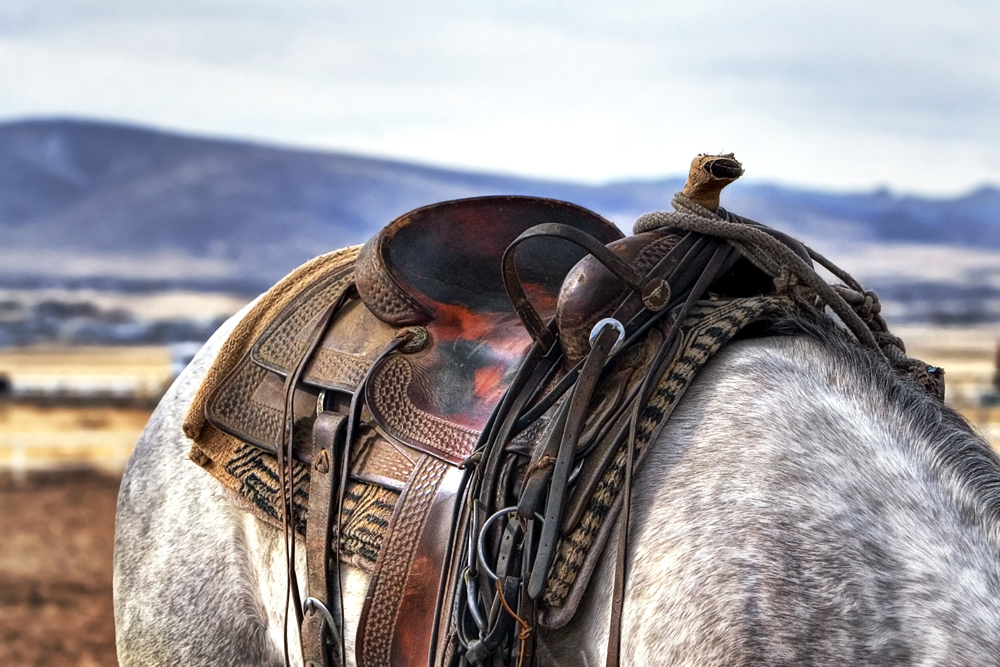
Sitting is generally harder for my back than standing or lying down. Being well enough to ride a horse, especially fast over bumpy ground, seems like the ultimate achievement to me. But if I really got serious about it and gave my back a lot more attention, care, and exercise than I have been — it might be something I can do one day. Photo by Pixabay/Bhakti2.
Also I got very slack with exercise and going to the gym, and I've really been suffering from that in the last several months as my muscles have weakened. I just have to get back on it, and stay on it. Even if it means getting passes at Bible College instead of distinctions. My current weakness is so bad it's almost like starting all over again with exercising, going very slow and very light. Since if I overdo it my back locks up again and then I'm going backwards, not forwards.
As you read, try to keep thinking about your own greatest weaknesses — and what you can do about them. Assuming they're not completely impossible to overcome, then they should be given a very high priority on your list of prepping tasks. Perhaps more priority than they have been given when there are so many other things that are distracting, immediately demanding, and attention-grabbing.
Endocrine Issues
My other really serious weakness in terms of long-term survival without modern society is that I'm dependent on prescription cortisone. Last time I tried to reduce it (not stop it) I thought it was going well. Until one day when I suddenly felt like I'd been shot through the chest, passed out, turned blue, had a minor fit while unconscious, and ended up in hospital. Whenever I forget to take it the chest pain returns, along with the other symptoms if I don't have any more cortisone.
It's not impossible for me to get off it permanently, but it's going to be a long haul and it would involve (among other things) getting a lot more rest than I've currently been getting.
Location
My other really major weakness (much worse than stress) is that I live in a suburb. I'm within walking distance of enough undisturbed natural bushland that potentially I could "live off the land" as a hunter-gatherer indefinitely if I was a lot more healthy physically. But there would be much better options than that, like living in an area where it's easy to grow and produce food, and with a much lower overall population density, and further away from a large city (Sydney).
I live on a quarter-acre block, so it's not completely impossible to try to live from potatoes and things like that, with small livestock, perhaps guinea pigs even. Apparently 20 guinea pigs are enough to keep a family of four in meat. Since they breed so fast — by the time they're old enough to even tell what sex they are, the females are already pregnant. Though I suspect that quote about only 20 animals comes from South America, where they are eaten regularly, and where the animals are much bigger than the domestic pet ones common in Australia. They're more like the size of a large hare.
Also the population density of my suburb (plus all the people fleeing from Sydney, many of whom would follow a route that goes close to where I live) would make it extremely difficult to hold onto those resources.
I may or may not have a few places in rural areas where I could potentially go and live off the land in the case of a total collapse of civilisation. But (hypothetically speaking) if I did, all of them would be a few hours drive away from where I live. Which means that in the case of an extremely rapid collapse (especially an EMP) I may not be able to get there at all.
It would be much, much better to be already living in and assimilated into a rural area well before a permanent crisis eventuates.
It's good to think of images that can motivate you. Everyone has their own preferences for these. Often as a child I'd pretend I was a cowboy. To become one in real life would mean I'd beaten my back problem, my location problem, and the problem of transport (and perhaps also food) without modern technology.
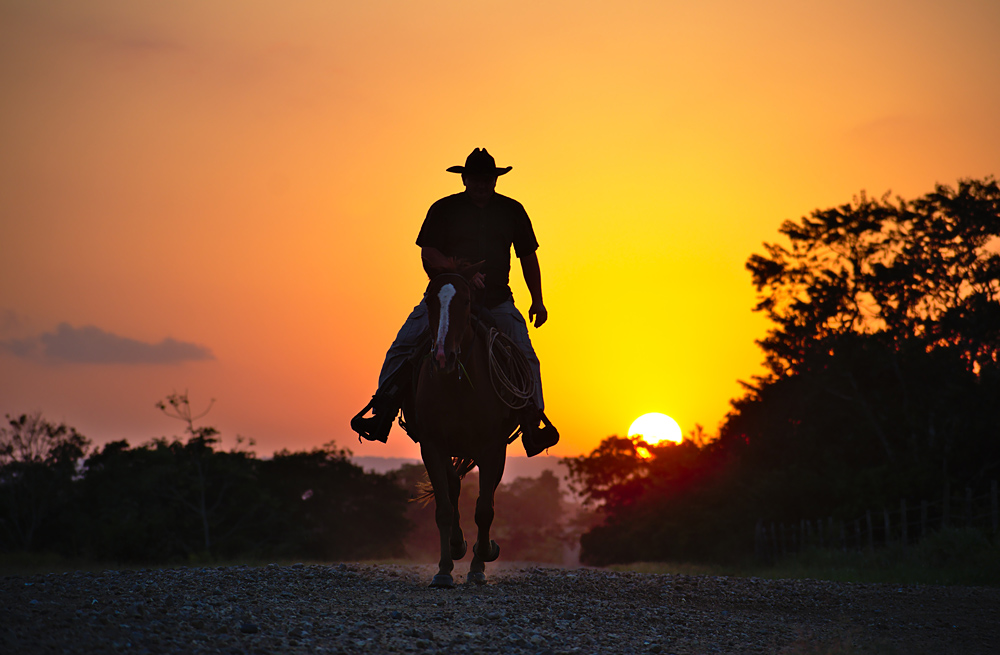
I always thought you were meant to ride off into the sunset, not away from it. It must be a sunrise. Photo by Pixabay/RonaldPlett.
Stress
Another weakness I have is susceptibility to stress out about things. A lot of people have this. It's not the worst thing ever — and in a sense it's good — in that it's no doubt part of why I'm a prepper at all. But in a prolonged emergency situation, it will be important to take measures to not let stress get too out of hand — and not be rushing around wishing I could do 10-100 times more things in a day than is possible.
Once again, the solution is to do less — which means to prioritise what's most important, and leave out the less important things.
Overview
All of these weaknesses are not completely impossible for me to overcome — but its been a long time, and I haven't yet. Which means that I need to give them a lot more attention than I have been up till this point.
It's possible that there are some specific weaknesses which apply to you , which might need more focus than they've been getting.
Cover image by Victor Moussa / Shutterstock. Glowing emerald crystals resemble the mythical substance Kryptonite — Superman's greatest weakness.
Prelude to Catastrophe The world had been teetering on the edge of conflict for years. Political tensions, economic rivalries, and territorial disputes had escalated, creating a global atmosphere of distrust and fear. Nations fortified their borders...
Surviving the collapse of modern society would require a mix of practical skills, knowledge, and mindset. Here are some of the most important skills: Basic Survival Skills: ...
Nuclear Winter
A nuclear winter is a theoretical scenario that would follow a large-scale nuclear war, characterized by severe and prolonged climatic cooling and other catastrophic environmental effects. Here's what it might be like: ...

 Welcome to Prepping.com.au, the new web magazine.
Welcome to Prepping.com.au, the new web magazine.
 What is Prepping? A guide for normal people to get started.
What is Prepping? A guide for normal people to get started.
 How to use this site. When all else fails, read the instructions.
How to use this site. When all else fails, read the instructions.
 This is your mission, should you choose to accept it.
This is your mission, should you choose to accept it.

